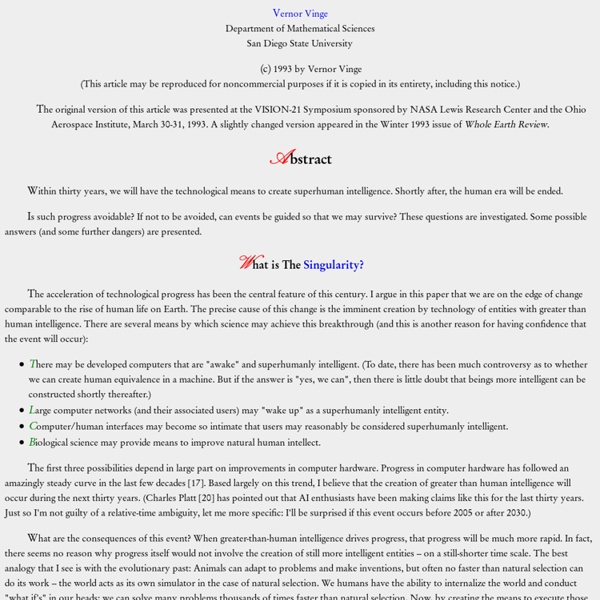Three Major Singularity Schools : The Singularity Institute Blog
I’ve noticed that Singularity discussions seem to be splitting up into three major schools of thought: Accelerating Change, the Event Horizon, and the Intelligence Explosion. Accelerating Change:Core claim: Our intuitions about change are linear; we expect roughly as much change as has occurred in the past over our own lifetimes. But technological change feeds on itself, and therefore accelerates. The thing about these three logically distinct schools of Singularity thought is that, while all three core claims support each other, all three strong claims tend to contradict each other. I find it very annoying, therefore, when these three schools of thought are mashed up into Singularity paste. But what is still more annoying is when someone reads a blog post about a newspaper article about the Singularity, comes away with none of the three interesting theses, and spontaneously reinvents the dreaded fourth meaning of the Singularity: Apocalyptism: Hey, man, have you heard?
The Coming Technological Singularity
==================================================================== The Coming Technological Singularity: How to Survive in the Post-Human Era Vernor Vinge Department of Mathematical Sciences San Diego State University (c) 1993 by Vernor Vinge (Verbatim copying/translation and distribution of this entire article is permitted in any medium, provided this notice is preserved.) This article was for the VISION-21 Symposium sponsored by NASA Lewis Research Center and the Ohio Aerospace Institute, March 30-31, 1993. It is also retrievable from the NASA technical reports server as part of NASA CP-10129.
Singularity Summit at Stanford
An Annual Conference onScience, Technology, and the Future The Singularity Summit is an annual conference on science, technology, and the future co-produced by MIRI and Singularity University. Topics explored include artificial intelligence, brain-computer interfaces, the Singularity, robotics, regenerative medicine, and big picture issues on the trajectory of human civilization. The conference was founded by MIRI, Ray Kurzweil, and Peter Thiel in 2006. Past speakers at Singularity Summit include inventor and futurist Ray Kurzweil, philosophers David Chalmers and Nick Bostrom, nanotechnology pioneer Eric Drexler, author and scientist Douglas Hofstadter, Paypal co-founder Peter Thiel, Sebastian Thrun of Google’s driverless car, roboticist Rodney Brooks, AI researcher Peter Norvig, Intel CTO Justin Rattner, X Prize Foundation CEO Peter Diamandis, Mathematica and Wolfram Alpha creator Stephen Wolfram, economist Robin Hanson, physicist Max Tegmark, and author Michael Shermer. Summit 2012
Singularity Hypotheses: A Scientific and Philosophical Assessment
What is the Singularity? Existential risk or cultist fantasy? Rapture of the nerds? An unstoppable intelligence explosion? The rapid acquisition by humanity of god-like powers? The rise of Terminator-style killer robots? Computing pioneer Alan Turing wrote as long ago as 1951 that "at some stage therefore we should have to expect the machines to take control". “Let an ultraintelligent machine be defined as a machine that can far surpass all the intellectual activities of any man however clever. Since that time, the notions of 'intelligent explosion' and 'technology singularity' have increasingly passed into the public awareness. But are any of the accounts of the technological singularity credible? A new book, "Singularity Hypotheses: A Scientific and Philosophical Assessment", is about to be published, that gathers the latest thinking about the singularity from a who's who of deep thinkers. About Dr Amnon Eden: Dr Eden's publications include: About David Pearce: Logistics: Amnon H.
Nick Bostrom's Home Page
Singularity Network
Eliezer S. Yudkowsky
Ben Goertzel, PhD
Alvin Toffler
Alvin Toffler (born October 4, 1928) is an American writer and futurist, known for his works discussing the digital revolution, communication revolution and technological singularity. He founded Toffler Associates, a management consulting company, and was a visiting scholar at the Russell Sage Foundation, visiting professor at Cornell University, faculty member of the New School for Social Research, a White House correspondent, an editor of Fortune magazine, and a business consultant.[3] Toffler is married to Heidi Toffler, also a writer and futurist. They live in the Bel Air section of Los Angeles, California, just north of Sunset Boulevard. The couple’s only child, Karen Toffler, (1954–2000), died at the age of 46 after more than a decade suffering from Guillain–Barré syndrome.[4][5] Early life and career[edit] Alvin Toffler was born in New York city in 1928. In the mid-’60s, the Tofflers began work on what would later become Future Shock.[6] His ideas[edit] Critical acclaim[edit]



